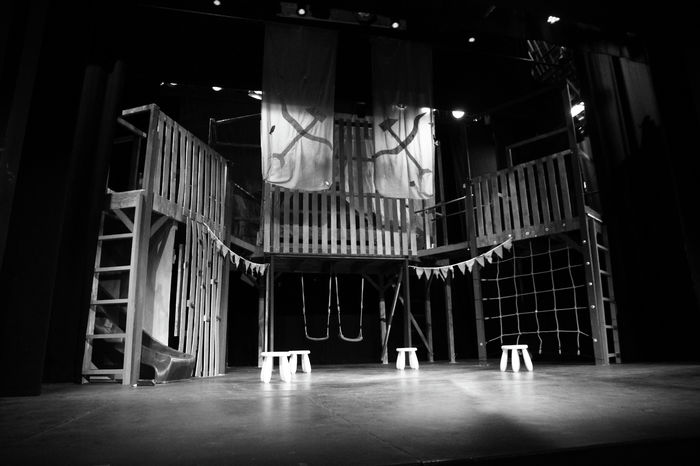A View From the Bridge: A universal play of ambiguity
Producer Ed Paget talks about the new and fresh staging of Miller’s classic tragedy.

"They are like animals that have torn at one another and broken up without a decision, each waiting for the other’s mood.”
At the beginning of the process of staging a production of Arthur Miller’s A View from the Bridge, this stage direction really stood out. It gave the sense that this is a play that explores the primal side of human nature.
The play can be interpreted almost as a case study, enhanced by Alfieri’s framing monologues, of how essentially good and well-intentioned people can do the wrong things for honest reasons. The play itself doesn’t really pass judgement on any of the characters, but rather presents the events in an objective manner. It is this element of objectivity that we wanted to push to the fore.
In this way, our production of A View from the Bridge is not exactly the most orthodox. Given that the aim of the production is to condense all the core elements of the play to their purest form, we have stripped away all spatial and temporal signifiers, presenting the action in a way that hones in on the relationships and drama that unfolds. Of course the script itself contains such signifiers, but the non-naturalistic staging coupled with the actors’ use of their own accents adds to the universality of the play’s main themes. The issues that the play deals with are timeless and ubiquitous, and the play could just as well be set in the present-day USA and focus on Mexican immigrant families. For that reason, displacing the play geographically and temporally as we have really appeals to the relevance of its central dilemma.
"There are no set heroes or villains, at least on the page, but rather people who just get caught up in their preconceptions and prejudices."
Another aspect of the production which we took particular interest in is noise. The play inhabits a ballsy, noisy world. Many of the male characters within the play – Eddie more than any of them – love the sound of their own voices. Dialogue for them is what happens when someone interrupts their monologue. We’ve decided to add to the noise of the play by having a drummer on stage to help punctuate moments of tension. In a climactic scene at the end of the first act, the audience is confronted not only with the power radiated by Marco (played by Ben Galvin) as he raises a chair above Eddie’s head, but also by a formidable and chilling drumming crescendo, raising hairs and filling the auditorium with a tense anxiety. This, coupled with moveable set, gives the production pulsating energy, ready to explode into life at any given moment.
At the very heart of A View from the Bridge is a story of ‘us’ versus ‘them’. This is ultimately what the conflict between the Italian immigrants and Eddie (played by Will Batty) is about – fear of change. At its crux is the destructive effect of toxic masculinity within a rural-immigrant family tradition that’s struggling, desperately, to cling to an increasingly outmoded social dynamic. For Eddie, the arrival of Marco and Rodolpho signifies an unwanted change, with Rodolpho, in particular, eroding his stubborn moral code.
Ultimately, A View from the Bridge is one of the greatest tragedies ever written, and we think we've done it justice. It is a play we hope everyone has the chance to watch, and above all things, it is a gripping story. There are no set heroes or villains, at least on the page, but rather people who just get caught up in their preconceptions and prejudices. It is up to the audience to decide who their heroes and villains are.
A View From The Bridge plays at the ADC Theatre from 21st to 25th January.
 Features / How sweet is the en-suite deal?13 January 2026
Features / How sweet is the en-suite deal?13 January 2026 Comment / Will the town and gown divide ever truly be resolved?12 January 2026
Comment / Will the town and gown divide ever truly be resolved?12 January 2026 News / 20 vet organisations sign letter backing Cam vet course13 January 2026
News / 20 vet organisations sign letter backing Cam vet course13 January 2026 Arts / Fact-checking R.F. Kuang’s Katabasis13 January 2026
Arts / Fact-checking R.F. Kuang’s Katabasis13 January 2026 Music / Inside Radiohead’s circle13 January 2026
Music / Inside Radiohead’s circle13 January 2026










